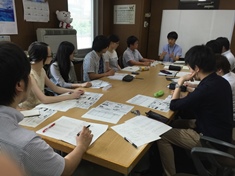

Theoretical, empirical and international comparative studies on ideal school management and organizations to guarantee the right to education, and on related governance
This research group primarily focuses on the following topics:
1. Contemporary school management theories: school improvement from the viewpoint of guaranteeing the right to education; leadership in education (distributed leadership); school organization theories; school evaluation; comprehensive management in education based on the community; professional learning community; local government administration and relations between the government and the private sector; and other topics
2. Educational governance theories: comparative study on public school governance between Japan and the U.S.; national and local educational governance structures (including schools) and governing bodies; interactions between governing bodies and learning processes; ideal approaches to cooperation and collaboration with professionals in other child development fields (e.g., welfare, medical care and public health); and other topics
3. Theories of development of expertise in educational professionals: the development of expertise in principals and other teachers in management positions and in other teachers and that of their organizations in terms of autonomous school management and school improvement; organizations for lesson studies and in-school studies, and related practices; examination of training programs for educational centers and educational research institutes; and other topics
Associate Professor SHINOHARA, Takeshi
School management theory looks at what defines a school that guarantees the right to education and model organizational characteristics and management. Ideal school management requires both internal and external aspects of education to be addressed: internal aspects with a focus on the development and learning of children as well as educational content and practices; and external aspects with a focus on the improvement of educational policy, educational legal systems and educational administration. Based on my awareness of these issues, I have focused on educational governance reform in American urban school districts while having interests in the topics outlined in the overview section on the right. To ensure the right to education for all students, I have studied the management of schools open to relevant parties and the creation of democratic school communities.
Since the implementation of decentralization reforms in the 1990s, Japan’s education policy has emphasized the leadership of school principals in autonomous school management. In the U.S. and Europe, however, school management theories and school leadership studies no longer view certain people in a heroic light in relation to leadership theories. Rather, people have become more theoretically interested in contributions made to school management by people engaging in educational practices. In particular, distributed leadership theory holds that leadership in school management involves not single leaders (e.g., principals), but both stakeholders (e.g., teachers and local residents) and contextual factors (e.g., school culture and conditions). As such, the theory provides a perspective from which to clarify school management processes in light of their relations with various parties. Today, ideas based on this theory are already applied to practical school improvement initiatives.
How can we interpret this theory in Japan? My research interest is to proceed with studies on this theory with an eye to the theoretical possibility of contributing to school improvement and to pursue school management theory through comparison with theories and practices in the U.S. and Europe and in consideration of related findings in many other areas of specialization.